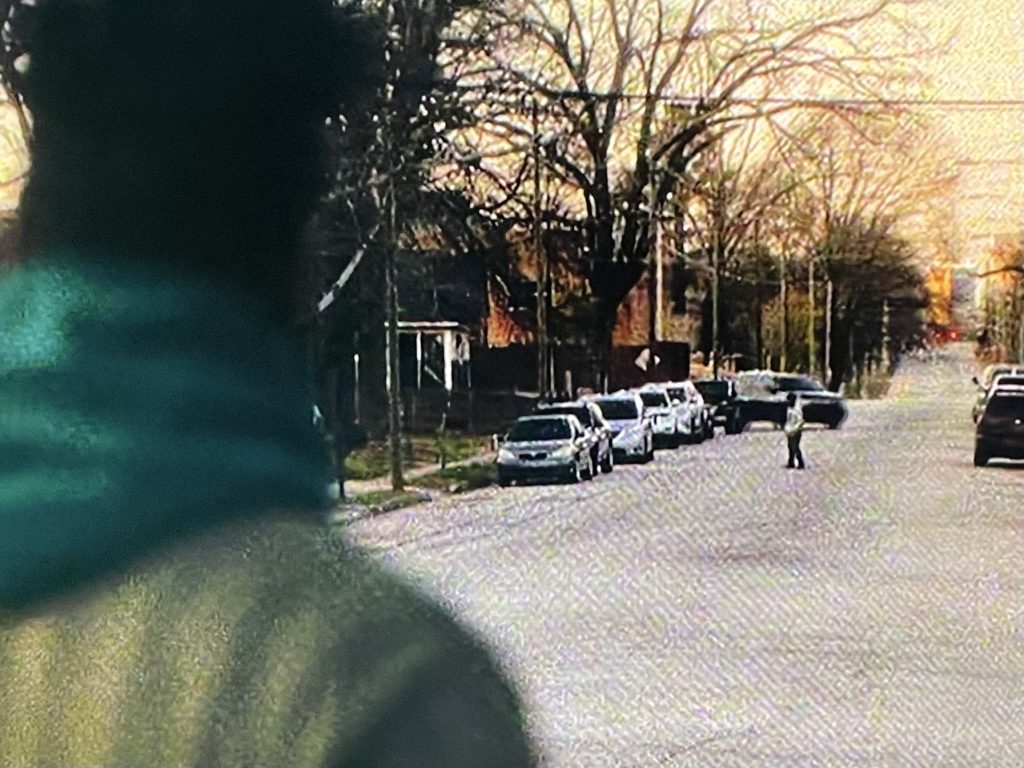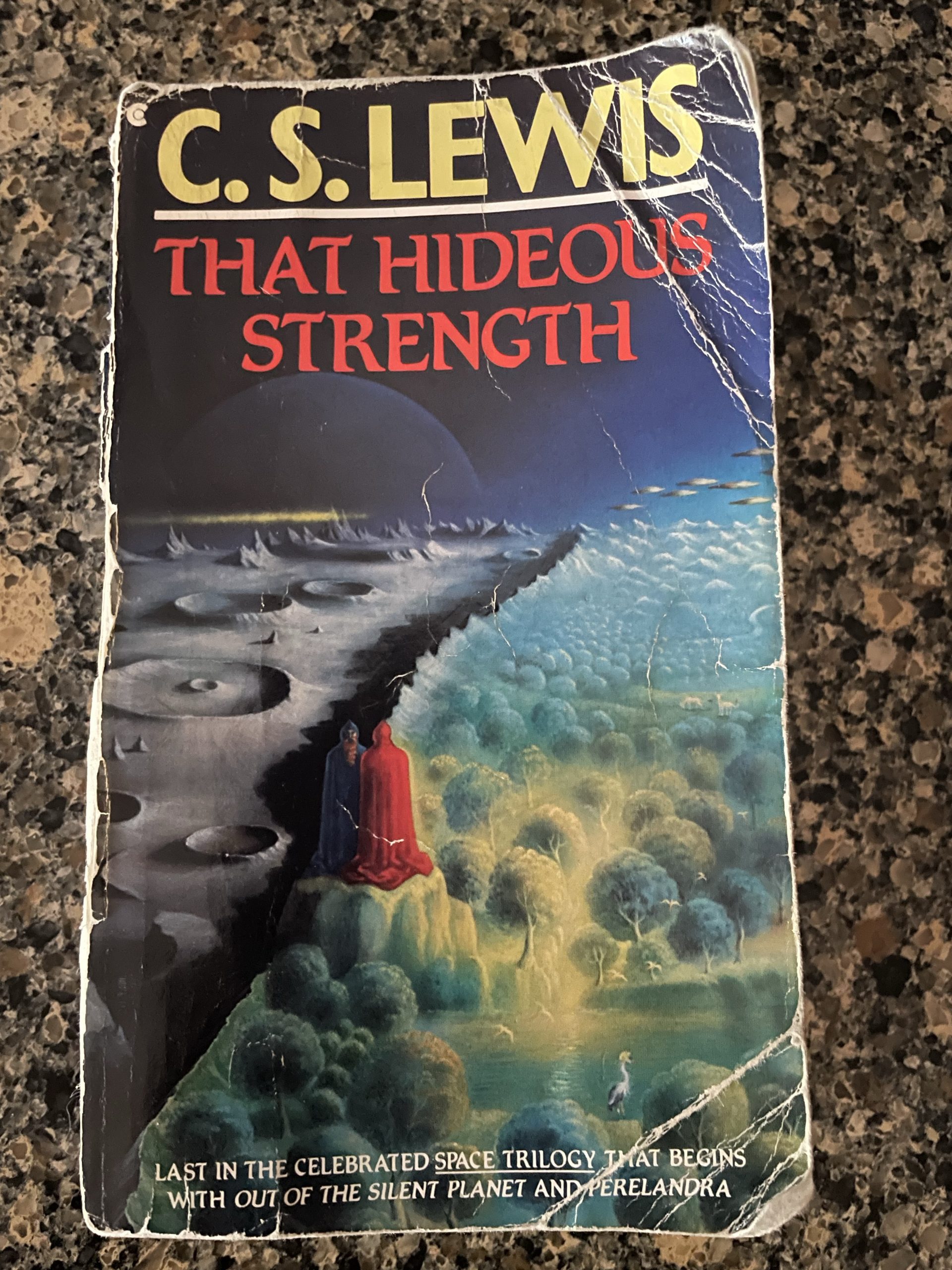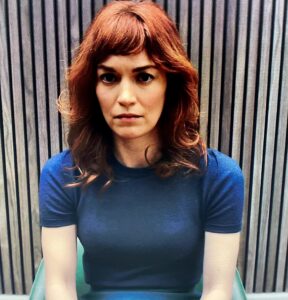Posts Tagged ‘technology’
FEERSUM ENDJINN, A No-Spoiler Review
Iain M. Banks is a Scottish writer who produced literary and science fiction. He is a must read for all scifi fanatics. I only say this to the purists because if you are not a scifi purist, you might find Banks challenging. This is a review of FEERSUM ENDJINN, one of his scifi books. I have no idea if his lit fiction is easier to consume. That is not my genre. He wrote his literary fiction under the name: Iain Banks…without the “M” middle initial.
The Short Review
I recommend FEERSUM ENDJINN with reservations. Yes read for these reasons:
- If you want to gather the fathers and mothers of scifi into your knowledge base, you need to read Banks. Some would say, start with Consider Phlebas (the first novel of his Culture series). I will read that one next. Review will follow.
- Banks writes honestly in that he is someone who sees technology in his story as a power that infects every aspect of culture (will explain more in the longer review)
- You find a story thread in this novel that creates tension. The mystery is embedded in the story and characters and even the style of writing, but the reader has to work to figure out the narrative.
My reservations:
- Very little of the arc is made plain to the average reader, the story is a nut to crack. Not everyone wants to work that hard.
- 4 points of view give the narrative its shape, not all of those POVs are created equal
- One POV is told from the perspective of a creature, probably a bird of some type. It does not know traditional spelling so the reader will have to endure paragraphs that are confusing…reading sentences like this: That woz how we used 2 reech our hoam, 1 ov thi birdz tells me. The narration written in this form is about 1/6 of the book and it was very unpleasant for me to read…even though I knew Banks was doing something experimental and interesting. I wanted to like it, but didn’t.

The Longer Review:
FEERSUM ENDJINN is a story, rated PG or PG-13…Regarding the PG-13 rating, there is a reference to a character in bed with two women…and a couple of other random references to sexual desire that might deem the book PG-13…however, those references reveal character and were not given much airtime overall. For the most part, the characters are not interested in, or engaging with sex. Violence is also not prominent in this story.
The mystery lies in the future earth and in what form it is inhabited. Four characters give the sense of what this reality might be. Seemingly, Earth is really messed up. People are living underground and there is a battle between AI and a computer program that gives human beings their existence. I didn’t fully understand this dynamic from the text, but read a few articles to help me grasp the full meaning. The story was imaginative and made me wonder about the world, but overall…I found it difficult to connect with any of the characters. Maybe Gadfium (on of the POV characters), but ever he/she only sometimes evoked my empathy. I call Gadfium he/she because of the story world that brings characters back from death, but sometimes in male or female or even animal form.
A book that requires this much work to understand is not a joy for everyone. However, if you want to read the really nerdy people on Banks like Professor Joseph Heath you might begin to understand how groundbreaking was Banks’ vision of the future.
When I read Consider Phlebas later this year, I’ll comment on this more, I hope. For now…you have to read one Banks novel if you’re a fanatic and this one could be the one for you.
THE FERRYMAN, A No-Spoiler Review of the Novel
Published in 2023 and still in hardback only, THE FERRYMAN, a novel by Justin Cronin, was a surprise find. My friend tipped me off. She is a serial reader, but normally reads lit fiction. She knows I read science fiction and speculative stuff. This book is science fiction and I’m not spoiling here. The first hint of a future/science fiction reality comes in the prologue. For the beginning half of the of the novel I was captured by the beauty of the writing. However, it’s always difficult to write a great ending, and THE FERRYMAN’s story/plot is complicated, very complicated and I’m not sure Cronin pulled it off.
First the Short Review: I Recommend THE FERRYMAN with Reservations
- Overall, lovely writing
- Suberb mystery and tension
- Interesting world-building
My Reservations:
- This is a long book, many words. Did it need to be this long?
- The last 1/3 of the book is a lot of explaining…the mysteries are not easily unwound and I’m still not sure I really get the ending
But still…it was a fun read. Here is one example of lovely writing in an early chapter:
“It came as a pleasant shock to me, how the man I’d known as a rather dry intellectual transformed himself so completely into a craftsman–a man who actually made things that the world could put to practical use Which only goes to show that people are more complicated than they let on and that even tragedy (sometimes only tragedy) can open the door to who we really are.”
This idea that tragedy opens up doors to identity is a theme that runs through the novel.

The Longer Review:
THE FERRYMAN’s setting is the fodder for much of the good writing. Prospera, a temperate island utopia, is home to a class of people known as Prosperans. Think Brave New World. Its inhabitants not only live and eat like royalty, they never die. In this world a technology exists that transfers the consciousness of an elder individual into a new body. Much of this process is surrounded in mystery because when the transfer takes place, memories are also wiped.
The new consciousness in a new body is in theory “the same person” being reborn, but without the baggage of memory. So is it really the same person? The reader wonders. For example, the main character, Proctor Bennet, dreams, and his dreams indicate a previous life, perhaps? Mysterious, though Prosperans are not supposed to dream. Something is amiss with Proctor Bennet.
Moreover, all is not well in Prospera. This becomes clear early in the story and drives much of the tension. There are other oddities in this world. Children with the re-inserted consciousness come from across the water on ferries at an older age, not as babies. All Prosperans have monitors inserted into their arms that measure their health and well-being. More importantly, an underclass of people perform the menial work on the island. These people have children naturally, live in a slum called the Annex, and do not seem to have access to the life-preserving technologies of the Prosperans. However, they make great art…an interesting discovery along the way, that those living in the Annex (as opposed to the Prosperans) live deeper lives, even though they are the underclass in society.
Proctor Bennet is a ferryman. He assists elders in the society who are ready to “end” their current lives. All this is done calmly, with signed contracts and quiet ceremony. When his own father is ready to board the ferry, Proctor is called and escorts his father to the ferry until his father unravels. A “scene” at the ferry is exactly what the Properans hate. Proctor’s experience around his father’s ugly departure across the sea thrusts him on a fact-finding mission. Clues emerge all around him. It’s around this section of the novel that I got the feeling there was glitch in the Matrix.
Except, the Matrix did the explaining soooo well. Maybe, this was because the Matrix was a film and not a novel. The backstory that unfolds in THE FERRYMAN is convoluted and complicated. The layers upon layers eventually are revealed, but the revelation felt forced to me, and so much less interesting than the setup. There was also a degree of cliche that felt disappointing to me. Same old, same old villains. Same old, same old catastrophe that set the thing in motion. All this is revealed by lots of explaining and lots of people having conversations with one another. Certainly, there needed to be some of this, but I felt there was too much. The style reminded me of Asimov, who loves to put two “smart” people (usually dominant white males) in a room together talking about and therefore telling the audience what’s going on. I’m not a fan of the style. So…those are my hangups. I think many will love this book. I know folks who adore Asimov for his ideas (if not his writing), but if I were you, I would maybe wait for the paperback, or pick up the audiobook…THE FERRYMAN could be fun to enjoy on a very very long road trip.
THEY CLONED TYRONE, A No-Spoiler Review
Tudum, Neflix’s official fan site, calls THEY CLONED TYRONE a gonzo sci-fi caper. I watched it with my son last week, a second time with my husband last night. Here’s my review. I enjoyed this caper at least as much the second time through. THEY CLONED TYRONE is rated R for violence, nudity and language. This film is streamable on Netflix.
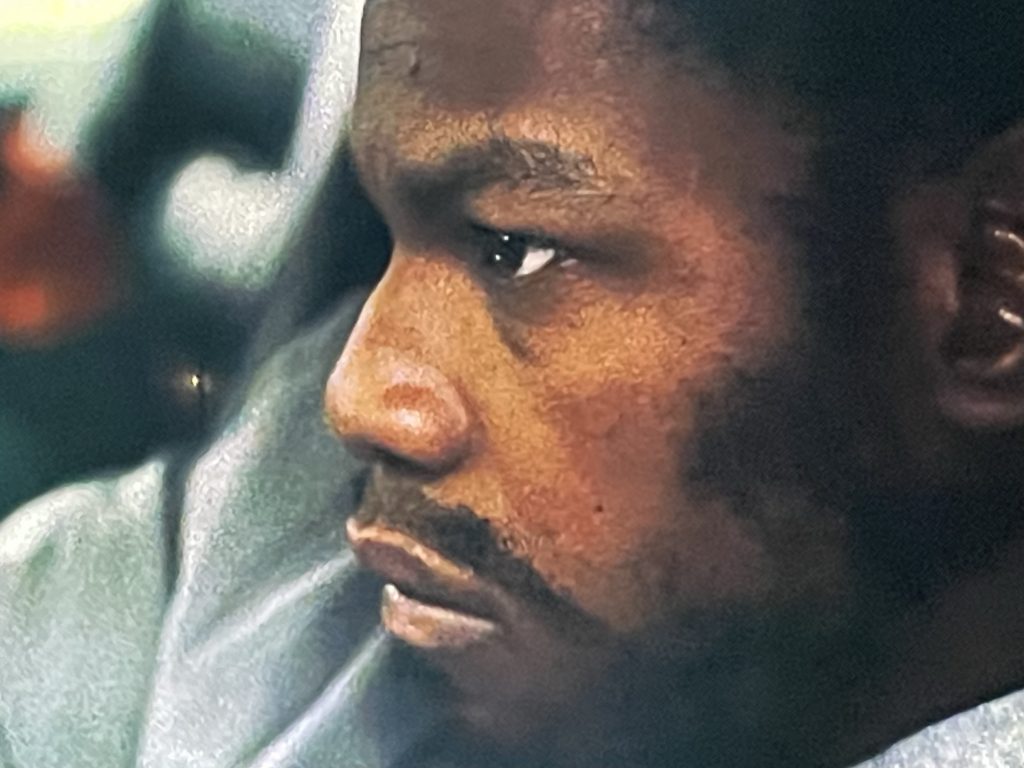
The Short Review
5 Reasons I recommend this film
- starring John Boyega, Jamie Foxx, Teyonah Parris, a fantastic trio, absolutely dynamic in all good ways
- authentic and gritty including design elements wonderfully contrasted in the 2 versions of “the Glen” portrayed
- a story that surprises…even knowing a clone is involved (see title), there are still some fantastic mysteries to solve
- THEY CLONED TYRONE was laugh-out-loud funny in parts, I found the dialogue and characters delightfully entertaining
- a serious social commentary worth contemplating
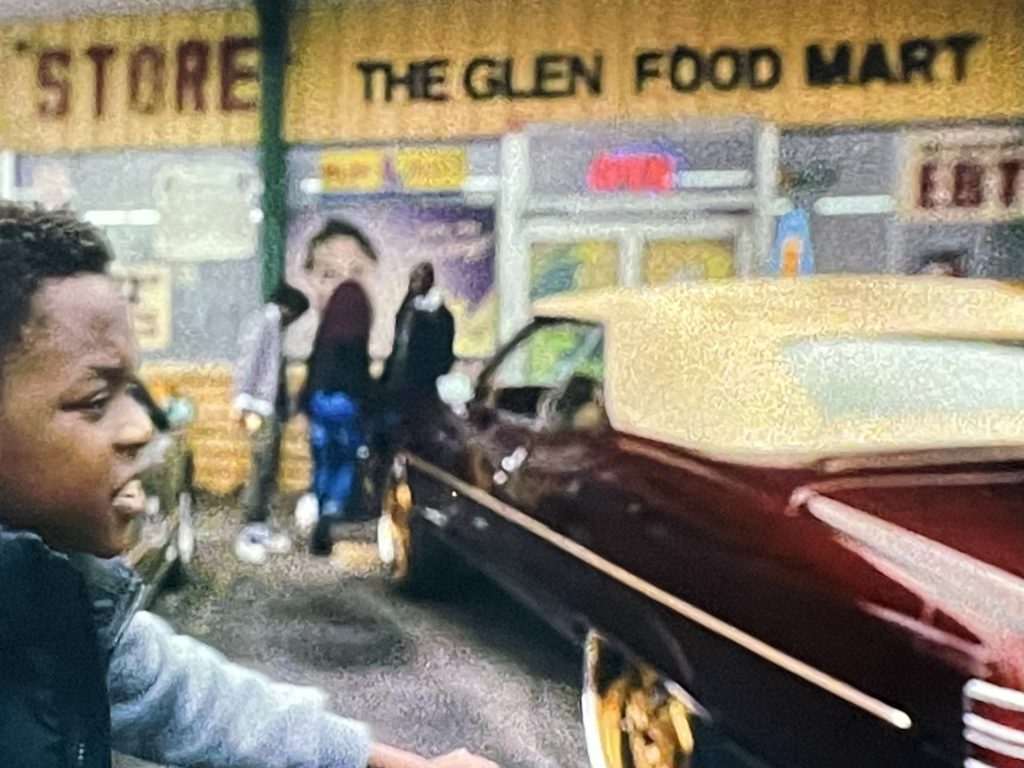
The Longer Review
When Jordan Peele decided to get into the film creation business and write/direct Get Out, Hollywood (and the general audience) sat up and took notice. Not only was Get Out entertaining in so many compelling ways, it was the fleshing out of an urban myth that a racially charged society like the US understood, even feared. Peele broke the mold with Get Out and then deepened his creative impact with Nope and Us, paving the way for creators like Juel Taylor. Taylor wrote and directed THEY CLONED TYRONE.
One of the things I loved about THEY CLONED TYRONE is that the narrative puts forward an allegorical reality in which systemic racism can be discussed in the real world. Moreover, it does this in an entertaining and thoughtful way. There is a scene early on, a face-off between the Slick, played by Jamie Foxx, and Fontaine, played by John Boyega, where Slick expresses his frustration about black on black violence in The Glen (the story’s setting–a poor black neighborhood of unknown location). To hear the phrase black on black violence verbalized in a narrative by a black character from the hood is a bold move by the filmmaker. He has to know that this idea has been taken up and championed by many conservative politicians, but rarely with appropriate context and compassion. However, when the Foxx character says it, I felt the sadness of the filmmaker’s commentary. It felt appropriately like a cry into the void.
Taylor didn’t overplay his hand with that line, but did leave the phrase vibrating throughout the rest of the narrative. By the finale of the film, the idea is turned upside down. I hesitate to say more because *spoilers*, but there are so many good questions posed in this film, I might just have to watch it a third time.
RED MARS, by Kim Stanley Robinson, A No-Spoiler Review of the Classic Scifi Novel
The Short Review
5 reasons RED MARS is a must-read for the scifi fanatic and anyone remotely interested in planetary geology:
- RED MARS is a KSRobinson classic, published in 1992 and winner of the Nebula and the first of his acclaimed Mars Trilogy
- The story imagines life on Mars in a way that feels scientifically viable and compelling, therefore relevant to the current and growing conversation around Mars exploration
- Scientists are the narrators of this story. They are also the heroes, sometimes the villains, the problem solvers and the work horses. I was especially drawn to the “builder” character, Nadia
- The planetary geology content, naturally integrated into the story, is breathtakingly fun
- Despite being over 170K words long, KSR does not get bogged down in the “how would that ever be possible” science scenarios, but drives the story forward through characters and the politics that pressure a budding Martian community
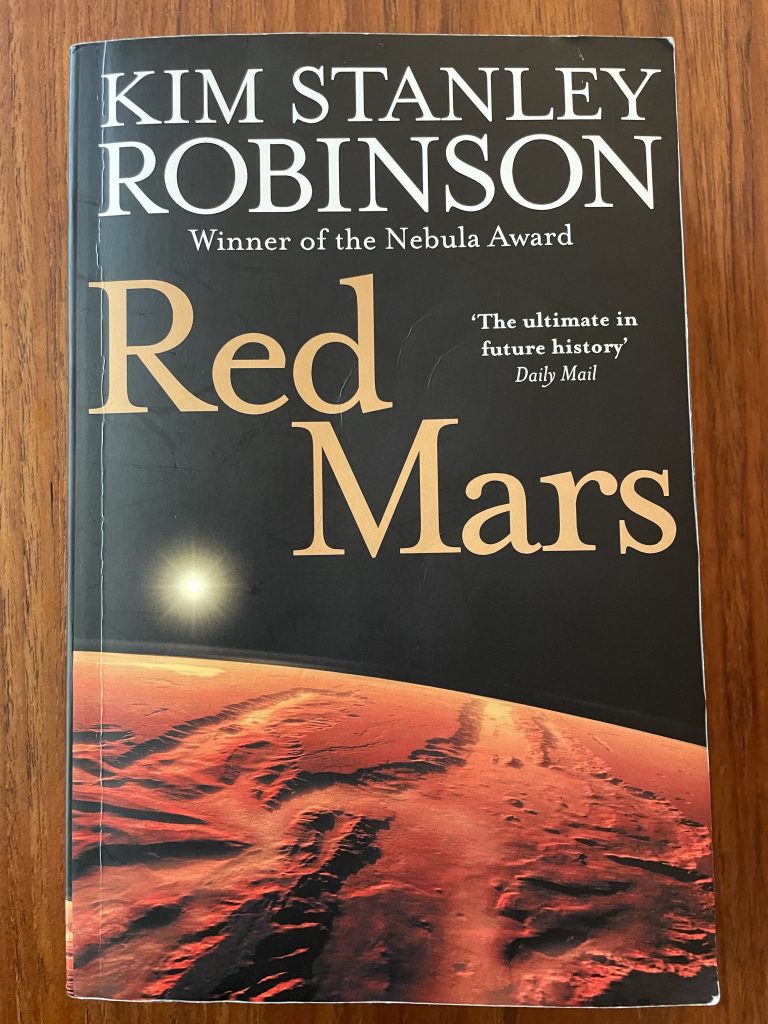
The Longer Review
RED MARS tells the story of the first 100 scientists sent to Mars by a multi-national Earth entity called UNOMA, United Nations of Martian Affairs. The story PG-13 (for some sexual content) follows about 10 of those scientists closely, though many others are referred to and are part of the action in direct and indirect ways. The novel is broken up into eight parts and each of the parts has a different primary narrator. I do think Robinson’s choice on point of view works in a novel this long, adding a level of complexity and depth to the very audacious idea that Mars might be “tamed” by human beings. Robinson plays with themes around the idea that really smart people might be able to build a better civilization from scratch, and form some kind of utopia, but does not make the task easy on the idealogues within his story.
Various characters, all of whom are scientists in one discipline or another, give voice to ideas of alternative governing and living environments. The sharing of abundant resources is the initial reality for the first 100, but eventually, when new groups arrive on Mars, the corporations who have funded the exploration and building, come calling for the planet’s vast natural resources.
The conflict that arises is somewhat predictable and draws out the best and worst of the people in charge who are trying to manage a fragile, but quickly expanding human presence on Mars.
Meanwhile, Earth is falling into total chaos. Robinson does not spend any time showing the reader Earth itself, but shows it via news stories viewed by the inhabitants of Mars. Earth’s chaos is also a reason why many thousands of migrants are streaming to the new world. Robinson does lean left in his politics (proudly so) and sees corporate giants as the villain, though the villain is also amorphous in the story. Robinson’s ideas don’t come across as preachy to me. He’s a deep thinker and a thoughtful writer, so he understands the grittiness of governing and the probable impossibility of building that utopia even if one does start with 100 brilliant scientists.
Many science fiction readers will not mind the length of RED MARS, but at times, I confess to being a bit bored and wondered…Where is this story going? However, I did stick it out and the payoff was decent. It stands alone as a novel, without the kind of cliffhangers that drive you to the second book. Will I read the next two books in the trilogy? Probably yes, but not this summer.
THAT HIDEOUS STRENGTH, A Review with Minor Spoilers
The third and final science fiction novel written by CS Lewis, THAT HIDEOUS STRENGTH, is touted by some as a fantasy novel. I hesitate to go deeper to explain why that might be, for fear of spoiling, but let’s just say that the story takes place on Earth, not in space, and one of the key characters who acts in a miraculous and decisive way to defeat the enemy, is a wonderfully fantastical character.
As I have talked with friends who have read all three, I get different answers about which is the “favorite” in the trilogy. There are individuals who love Out of the Silent Planet. I personally like it for its length…it is as short as a novella and a tight little narrative. Others love Perelandra. I appreciate Perelandra, but there are portions where reading was a chore. For me, THAT HIDEOUS STRENGTH is the true novel. It is my favorite of the three.
The Short Review: 5 Reasons I Recommend THAT HIDEOUS STRENGTH
- Compelling main character(s) both grappling with interior life, particularly with identity and faith
- A rich setting, a modern academic world and progressive (Lewis’ words) university leadership that feels creepy, yet familiar
- An amorphous and terrifying villain, well written and historically relevant
- In the midst of the horror, a comedic twist that feels like a Shakespeare switch-a-roo
- A companion novel to 1984. Many minds in this era of the 20th century understood the tyranny of government control. Lewis and Orwell were cut from that same cloth. Warnings that are relevant today and always.
For me, the young married couple, Mark and Jane, makes this story compelling in a way that is unique among the three novels in the trilogy. Jane is a crucial player and well developed. In the previous novels Lewis did not present the reader with a compelling female lead who was relatable. The Perelandra Queen is wonderful, but otherworldly. Jane, in this book, is utterly relatable. Her discomfiture with domestic life, her struggle with a husband who is caught up in his own professional world, felt deeply real. Mark is also real. Lewis highlights his hubris and insecurity, showing the reader how one might choose to align oneself with a horrific community. Mark’s longing for belonging, his hope for recognition are powerful human motivators and have the capacity to diminish the moral spine, especially if that spine is wobbly (as Mark’s is). Despite Mark’s poor choices, I got the feeling that Lewis, like the deity he knows and loves, has not given up on this lost soul. When Mark sinks low enough and faces the worst of himself, there is a promise of redemption.
THAT HIDEOUS STRENGTH is a story with complex layers. The deeper conversation about nations and their “haunting” is a topic I will not cover in this review, but in case you’re wanting to understand more, an article in The Imaginative Conservative called America’s “Logres”: The Mythology of a Nation helped me muse on what might be the American Haunting. That conversation is a crossover of the spiritual and the literary and takes the reader deeper into the mind of CS Lewis and those who were writing in like spirit, JRR Tolkien being one of those writers.
SEVERANCE, A No Spoiler Review
6 Reasons You Want to Watch Severance
- Two unique settings within a contained, small-story universe. (I will write more about this in the longer review)
- Amazing cast. Adam Scott as the stoic lead, Mark, with a supporting cast that includes Patricia Arquette, John Turturro and Christopher Walken
- Superb characterization and story-telling. The main character and all of the secondaries are complex, layered and quirky, adding to the slow-building tension
- The underlying moral and symbolic truths within the story are not yet fully baked but seem promising.
- This show has a slow ramp-up to gripping tension at the climax of this first season
- More to watch in the future because this past month, Apple approved a second season.
The Longer Review
SEVERANCE is an Apple+ production, the first season is complete, streamable now and free for subscribers.
Created by Dan Erickson and directed by Ben Stiller, SEVERANCE is not a comedy. It falls into dystopian mystery with a scifi vibe. A futuristic technology at the center of the story, allows those who work at a company called Lumon Industries, to surgically divide their memories between their work and personal lives. Those individuals are called The Severed. Most of the other tech is familiar and not so modern, for example, people still drive cars around the town.
I give this series a PG rating…it’s possible it will warrant a different rating later on, but so far the mystery is more Hitchcock than Ridley Scott. My ratings usually reflect the graphic nature of the show and not the themes which in this case are harrowing for my adult brain. Would kids enjoy the show? Probably not. You won’t see explicit gore, but you will feel tortured for these characters at the center of the story, in part because of their vulnerability, which is childlike. The value in watching it with your teen would be to discuss the ethics that emerge around the tech that is at the heart of the story.
Regarding the setting. There are two primary “worlds” in SEVERANCE that exemplify the two worlds inhabited by the employees of Lumon.
One setting is work, the Lumon Industries office building. It feels familiar upon entering, but creepily weird the deeper in you go. The interior design is sterile, with strangely vacant work spaces and long labyrinth-like hallways. The four employees the audience follows most closely work in a large white room with no windows or access to the outside world. They are forbidden to interact with employees from other areas of the building and spend their days huddled around computers doing a job that the audience sees, but doesn’t really understand. In fact, even these employees don’t fully understand what they do, how they do it and why. It’s described as something they feel. Their work is just one of many aspects of this situation that give rise to a suspicion about Lumon. Most of the workers, including Mark (Adam Scott) submit to the rules of the company. There are a few exceptions and those exceptions give rise to Mark’s suspicion about Lumon.
The second world is Mark’s town. This is a cold, dreary place. It feels like it could be Alaska or Canada and is probably unfamiliar to most of the audience. The cold and the dark and size of the town adds to the feeling of claustrophobia, something that permeates this story. Darkness also dovetails with the theme of grief. In episode 1, the audience learns that Mark’s reason for severing came about because of the death of his wife. Mark lives in a housing complex owned by Lumon where it becomes clear, he is monitored unbeknownst to him.
My recommendation to watch SEVERANCE comes with the caveat that I’m still not sure where the story is going. I have viewed the first season and loved every episode. Not everyone enjoys a slow build to a gripping climax, but I do when it’s done well and SEVERANCE does it well. So, if you’re tempted to stop after episode 1 or 2, don’t. The tension ratchets up and up and mysteries become creepier as the conspiracy is partially unveiled.
In my next post, I hope to discuss summer reading which will include:
ALL SYSTEMS RED, by Martha Wells, A No-Spoiler Review of the first novella in the Murderbot Diaries Series

ALL SYSTEMS RED is a story, entertaining and well-written, that one can read in about 4 hours. Rated PG-13 for adult themes. I read this novella on a flight from Minneapolis to Seattle. I flew on Delta and none of the airline’s tv/film options seemed very thrilling to me. I often try to see HBO or Showtime options when on a flight because I don’t subscribe to either of those services in real life. Thank goodness I had taken this book with me, hardback, but thin, lightweight and easy to pack because it’s only 127 pages.
And now, for my Short, No-Spoiler Review
I highly recommend ALL SYSTEMS RED for these 5 reasons.
- Original voice…the narrator has the appeal of an innocent, he/she is like a child, yet holds the capacity to narrate a futuristic society inhabited by humans and AI living and working together
- Genre bending…science fiction merged with mystery…in other words, a page-turner
- Thought-provoking ideas about AI and how future humans might understand morality/humanity in regards to AI
- Interesting world-building and a great set-up for subsequent stories
- ALL SYSTEMS RED would make a great audiobook. See the longer review for more
Longer Review:
Martha Wells has created a fascinating universe of humanity working and living off Earth, in space, in places that can only be reached via light-speed travel. She doesn’t fixate on the physics of the issue (regarding traveling across vast distances) but focuses on the gritty work life of humans and their bots. In the author’s futuristic world, full AI exist as sex workers and security units (SecUnits) and other helps in life. Also, some humans adopt robotic parts (augmented humans). So, there is a mix of how humans have integrated with tech and within the story world, there is little “judgment” about these realities.
While this is all true, the AI mind that narrates this story has a judgment about itself and humans. The view is not completely skewed toward disgust for humans, though there is some leaning in this direction. Granted, I’ve only read the first 1.5 novellas. But what works in the narrative is that Wells has put forward a more dispassionate, yet charming view of the world the way it is. I highly recommend these novellas as entertainment and am slowly discovering how they speak into deeper moral questions around humanity’s race toward the future, a future in which robots and artificial intelligence will be embedded. These books might appeal to the YA reader because the narrator is endearing and “young” feeling. The value in their education would be the discussion around tech and humanity’s future.
Regarding the narrator. The voice is absolutely charming. I did not listen to the book, but can imagine the voice. This book would be a pleasure to listen to.
To buy the first book, click on All Systems Red
Four of the series in hardback can be bought together. Click on Murderbot Diaries
For the least expensive version to try out novella #1, click on Kindle version: All Systems Red
For the audio version of novella #1, click on Audio of All Systems Red
DUNE Part 1, The film. A No-Spoiler Review

In a similar way that Peter Jackson pleased both the non-reading audience and the hyper fan of the LOTR books, it looks like Villeneuve will do the same for the his audience and fans of the novel, DUNE.
DUNE, the film, is the first of two. It’s only about half of the novel (yet another reason to entice your teen to read the novel), and there could be more films if Villeneuve decides to continue with the novel’s sequels. We’ll see how that goes. The later books are brilliant but probably more challenging for the average audience member to consume. Herbert’s world is a complex and mostly unhappy place on almost all counts.
First, The Short Review of DUNE
5 Reasons to See this Film, Especially if you are a Scifi Fan…
- Mostly pitch perfect and accurate (close to the novel) storytelling
- Herbert’s DUNE is a foundational work in the scifi genre and has a huge international following. Without DUNE, Star Wars might never have been made.
- A vision within the story that transcends culture and era
- Great casting
- An epic visual feast
Now, for the Longer Review…
If you want to go deep, super deep on DUNE, there are papers written, blog posts and articles that speak to why the story DUNE is one that has reverberated in many cultures, especially subjugated cultures, since it was released in 1965. This article is a good one, in case you want more breadth about the history. Click on the link for the Guardian’s penetrating reflection. DUNE article, Guardian.

True, the viewer is only getting a third of the character depth in the film version and for that reason, I encourage all to read (or re-read) the novel. It ages well. But, even if you don’t read the novel, Paul, Leto, Jessica, Duncan, Kynes and the Fremen come across very close to the novelist’s vision. I had two observations of change that caught my attention: Villeneuve did not portray the Atreides’ mostly male in-house staff accurately in terms of their suspicion of Jessica as the betrayer. Their suspicion of the one woman in the mix comes through in the novel, not in the film. Also, the gay Baron Harkonnen is a known child predator in the novel. I can guess there are many reasons Villeneuve decided to forgo this portrayal of the only gay character in the story world. Let him be obese and disgusting in the visuals, but diminish his child predator persona. That seems like a wise decision on many fronts.
The portrayals I loved:
Arakkis, the worms, the Fremen, the sitch, the general feeling of the Bene Gesserit, the Harkonnens, the Sardaukar, the ornithopters, Arrakeen, the costumes (including the stillsuit)…these are all perfect, as are the actors’ portrayals of their characters.
Overall, DUNE was worth the time and money. I highly recommend this film.
THE ANDROMEDA STRAIN, A No Spoiler Review
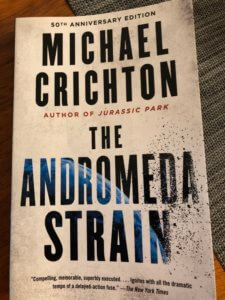
However, Crichton soon after became a best-selling author and gave up the idea of practicing medicine.
I read this novel because of a recommendation by a friend during Covid19…
Do I recommend this novel? No, I don’t and here are 5 reasons why:
- The novel puts forward an interesting premise, but not fully baked (I am pretty sure this novel would never get published today)
- Bland main characters. It’s hard to keep them straight, they all seem like the same guy (except they attended different Ivy League schools and have slightly different occupations)
- So-so tension, but nothing like one of his better books, Jurassic Park, for example
- Characters are all white dudes in lab coats and even the non lab-coat characters are all white dudes. *note…when THE ANDROMEDA STRAIN was turned into a film in 1971, the screenwriter changed one of the dudes to a female…even in the 70s the character line-up was thought to be way too monochromatic.
- Too much data and exposition and not enough heart. I felt nothing for all the people (except for the infant…who seems to be completely neglected)
Longer Review…
So…this novel became a best-seller and gave rise to a film that bears the same title. Both were hits/made a lot of money. In fact, this book catapulted Crichton’s career. I can only surmise that there was a great hunger for techno-thrillers at the time and that Crichton scratched an itch that had be itching for a long time.
The funny thing is, immediately following this read, I’m consuming Philip K. Dick’s, DO ANDROIDS DREAM OF ELECTRIC SHEEP and I am so wowed by the writing and how different it is from Crichton’s. Dick knew how to flesh out a character. Crichton did not, at least he didn’t yet. He got much better at it in subsequent novels, many of which I have enjoyed.
So, let me just nit-pick a little…
If I was ever to teach a writing class on the development of a writer…I might choose Crichton and force my class to read this book and then give them the pleasure of Jurassic Park as examples of how one gets better at the craft. THE ANDROMEDA STRAIN almost feels like a “freshman novel”, that novel written by an aspiring author who has one great idea, but can’t quite figure out how to tell the story.
In that class, I would also ask the students to read DO ANDROIDS DREAM OF ELECTRIC SHEEP, by Philip K. Dick, written in the same era.
There is a reason that BLADE RUNNER, a brilliant film and subsequent franchise, emerged out of Dick’s novel, published in 1968, one year before THE ANDROMEDA STRAIN.
The character of Rick Deckard is brilliantly written, fleshed out. The reader feels his pain, his angst, his story as he/she reads. Not only that, the secondary characters are complex, mysterious and full of emotion even when Dick writes about androids. His androids seem more human than Crichton’s actual human characters.
I do believe that Crichton saw his errors and improved immensely, but it will be a mystery to me for a long time that this book, THE ANDROMEDA STRAIN, was published and was sold and was read by so many, including me!
If for some reason you want to buy this book, click here.
To watch the film via Amazon Prime, click here.
HANNA, A Review of Amazon Prime’s TV Series

I rate this series R, mostly for its violence. HANNA, created and written by David Farr, also portrays a disturbing picture of childhood, so if you have young children/teens who want to watch, you may want to preview this before allowing them to enter into the violent world of Hanna. Other than that, I highly recommend this series. It skirts the line that is science fiction and dystopian.
Short Review of HANNA. 6 Reasons You Want to Watch…
- Well written story and well-crafted characters
- Outstanding performances by Joel Kinnaman, Mireille Enos (they’re reunited here…having starred together in the award-winning detective series, The Killing.) Hanna is played by Esme Creed-Miles. She’s a British actor, but pulled off the German accent. I don’t think she actually speaks German, but she did speak French fluently. Kinnaman is Swedish. He also carried the German accent and spoke a lot of German to make this role believable.
- Timely. A US intelligence service, broken into factions, clawing at more power? Perhaps too real…
- Truth and morality emerge in the most unlikely places and the story reminds us of that.
- I love the way the characters rarely shout. Erik (Kinneman) and Hanna (Creed-Mills) both have this quality. They speak with intensity, but always quiet and measured, understated. I found myself loving this vibe more than I thought I would, maybe my Scandinavian roots…
- A story set in Europe, especially Berlin, London and Paris. Hurray, given we cannot travel there right now.
Longer Review
One of the things I liked about this production was its willingness to go slow. That might sound weird because the story moves at a pretty fast clip, but there is also time in each episode to absorb what is taking place in the character’s lives, in their hearts. I attribute part of that pacing to the editing. THANK YOU DIRECTORS AND EDITORS! It surprised me sometimes what was not put on the screen/what was skipped, but it also revealed what was most essential for the story. I found my brain willing to allow the holes in the plot because the true drama was not withheld from my view.
In season 1, the audience is introduced to Hanna as a baby, also to her mother and to her mother’s savior, Erik (Kinneman) who ends up rescuing Hanna from destruction. Erik, though German, is an insider with the US intelligence agency that is accepting babies in order to turn them into super assassins. Erik becomes Hanna’s guardian and the audience believes he might actually be her father. He isn’t. When Hanna finds out he has lied to her about his biological relationship to her, she is enraged.
Telling the truth is VERY important to Hanna. This seems consistent throughout and is refreshing as a character trait. It grounds the viewer, even when Hanna’s allegiance to the “good” or the “evil” entities in the world seems confusing. Hanna punishes those who lie to her, even when those individuals are her allies.
That dynamic of telling truth versus lying, or shrouding the truth reminds me of how teens (I’ve raised a couple and counseled many) have a nose for truth or fiction. They sense when adults are lying to them. Just tell me the damn truth and don’t protect me from it because you think I can’t handle it said every teen ever.
And I love that about them. I loved that about Hanna. She is so pure in that sense, the audience is ready to root for her in just about any circumstance, even when it feels like she is about to give in to evil.
Hanna has been renewed for a third season. I look forward to seeing how the writers develop this story.
